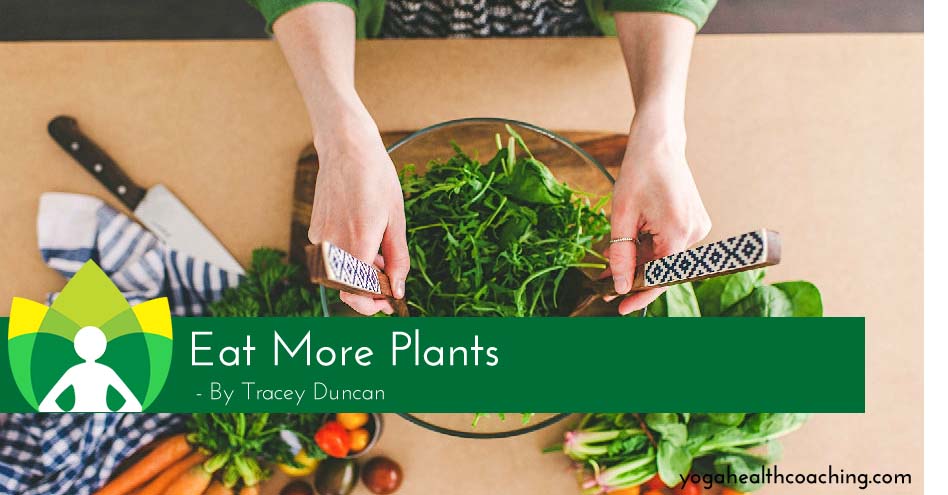
Eat More Plants
I need to confess that I have been defiantly avoiding writing about eating a plant-based diet. It isn’t because I don’t do it. It isn’t because I don’t think it’s important. It isn’t even because I don’t know what to say. It’s because, in my coaching experience, eating plants is the habit that people have the most resistance to.
Maybe it’s because I live in New Orleans, where fried seafood is a religion. Maybe it’s because I live in the South, where food and meat are synonymous. Maybe it’s because I live in America, where we famously consume more meat than any other country.
I’m Vegan (ish)
I could blame these cultural factors, but frankly, I know that I need to take some responsibility here. See, I’m vegan (ish). And despite my constant reiteration that I am a non-evangelical vegan and that it’s not my business to decide whether you should consume animal flesh or not, when people hear a vegan talking about a plant-based diet, they usually stop listening and start groaning.

Please don’t do that. Just hear me out. I won’t judge you if you don’t judge me.
Even though I think being a vegetarian is totally awesome, I am not trying to get you to go veg. I just want you to eat more plants. I am not suggesting that you stop doing something you love. I am suggesting that you start doing more of something that you already do anyways that will benefit you, your family, and the entire planet.
Going Vegan is Good for the Environment, Duh!
Seriously, y’all, the environmental argument is just common sense. Do I even need to go there? Think about how many resources it takes to keep you alive. Think about all the water, gas, food, land, jobs, etc. You’re a complicated being and it takes a lot to maintain the health of a sophisticated creature.
Animals (like cows and pigs and chickens) are also pretty sophisticated, and it takes a lot to keep them alive, too. So when we consume other sophisticated creatures, we are using not only the resources that it takes to fuel us, but also all the resources that it takes to fuel them. Add to that the cost of slaughter, processing, and shipping, and that makes animal consumption a practice that digs deeply into our communal resources.

Plants, on the other hand, make their own food, so they require far less external maintenance. Plus, you can grow them yourself and cut out all of the costs of shipping, packaging, etc. Basically, what I’m telling you is that for the price of some elbow grease and an uptick on your water bill, you can grow a lot of your own food. The cost on society is not only small, it’s actually negative considering that your plants will create a resource that we all need: oxygen.
So the more plants you grow and eat and the less meat, the more good you do for the environment and society and the less you tax it. Win. Win. Win. Even if you can’t grow your own plants, the cost of consuming a plant-based diet is significantly less on the environment than a meat-based diet.
Let’s Talk Karma Y’all
I’m not touching the moral argument here. Not on your life. What you think is right and wrong is definitely your business. But since we are all yogis (ish), let’s talk about energy exchange and karma.
There is a natural exchange of energy between plants and humans. What is waste to us (carbon dioxide) is food to them and vice versa. We feed them simply by doing something we have to do anyways: breathe. That is an equal exchange of energy.
Our relationship with animals is more complicated. In order to feed them, we must use up some (A LOT) of our human food resources. We could feed 800 million people with the grain that livestock raised for slaughter eat. That’s insane. There are 780 million undernourished people in undeveloped countries and 11 million in developed countries. So, with the food that we use to feed animals, we could feed more than the total number of hungry people in the world.
That is not an equal energetic exchange. We are trading quality of life for 800 million humans for the pleasure of eating meat, instead of just trading carbon dioxide for oxygen. Worst. Deal. Ever. We could feed all 791 million hungry people in the world and still have resources left to eat the occasional hamburger.
And Other Duh! Eating Plants is Good for You
But we don’t eat the occasional hamburger. The average American eats 164 pounds of meat per year. Even if you don’t want to think about the rest of the people on the planet, think about yourself. Meat consumption is linked to a host of health problems, including (but not limited to) heart disease, diabetes, cancer, and obesity. Eating more vegetables can help reduce the risk of these ailments. For example, simply adding a half cup of produce to your diet daily can reduce your risk of heart disease by 4% and your risk of stroke by 6%.
So eating vegetables is good for you. Duh. Moving right along.
 Eating more vegetables is also good for your karma. Since the exchange of energy between humans and plants is basically equal, no karma is created by eating them. When we consume another being, however, we take in the karma of both that being’s life and death. In other words, when you eat an animal, you eat its karma.
Eating more vegetables is also good for your karma. Since the exchange of energy between humans and plants is basically equal, no karma is created by eating them. When we consume another being, however, we take in the karma of both that being’s life and death. In other words, when you eat an animal, you eat its karma.
So that hamburger at McDonald’s is, karmically speaking, a lot more costly than the $1 you pay for it in greenbacks. It costs you both the life and death of the cow and also all the conditions of its life, death, and consumption. Basically, with that hamburger, you get a lot more than your bargained for: the karma of environmental waste, animal cruelty, factory farming, corporate greed, and underpaid employees. Even if you’re not looking to get enlightened in this lifetime, that is still a pretty fucking expensive hamburger.
So, y’all, if you don’t want to stop eating meat, fine. But consider adding more vegetables. And make sure you know the cost of your dietary choices, not just on you and your family’s health, but on the health of our cosmic community and terrestrial home.
Tips For Eating More Plants
- Make It a Game. How many different kinds of plants can you eat in a week? Start a competition within your family. Keep score. Whoever eats the greatest number of plant species in a week gets a foot massage from the person who ate the least. (I hope my wife is reading this. I would definitely win.)
- Cut Back on Packaged Foods. If you make an oath to cut down on the amount of packaging you bring home from the grocery store, your meat consumption will naturally decrease. You may be able to get away with not buying loose apples, but an unwrapped slab of bacon? No way. So unless you have chickens in your backyard that you are ready to slaughter, you will end up with a lot more veggies on your plate.
- Consider the Life of Everything You Eat and Whether You Want Its Karma. I am not suggesting that you sit around berating yourself for your food choices. What I’m saying is just be mindful. Think through the life of that celery or that pig. Consider the circumstances of its growth, its life, and its death. If you can’t handle thinking about it, maybe you shouldn’t consider eating it.


